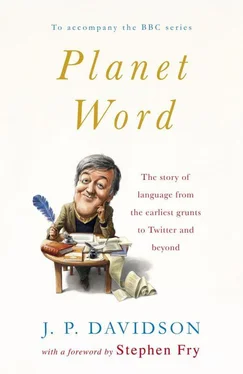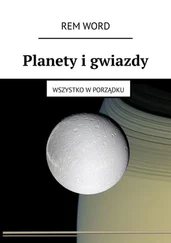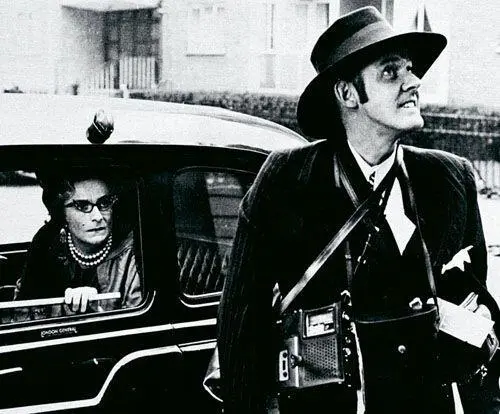
Barry Humphries and Barry Crocker in The Adventures of Barry McKenzie , 1972
Barry Humphries and a new generation of Australian writers and comics continue to keep the language alive with colourful imagery, but there is a sense that — bit by bit — Australian slang is under threat.
John Clarke agrees.
‘It’s very seldom that someone like Barry Humphries comes along, and I think somebody who can infuse the language with an enormous amount of imaginative metaphor and imagery that people will pick up is pretty unusual. My impressions of young people is that they are using the language of the internet and the social networking sites a lot more, and that language is a kind of shorthand in some respects.’
It’s a case of Save our Slang, says Kathy Lette.
‘The American influence is huge, because all the kids are watching the American programmes. So they’ve suddenly started talking like they’re in the New York ghetto — “see you later, dude” and all that stuff. It’s a real push to protect our slang, because we’ve actually realized that it is something quite precious and colourful and historic.’
Thousands of new words are added to the English language every year. No one knows just how many, but according to the word-tracking Global Language Monitor, a new word is created every ninety-eight minutes. It’s an extraordinary thought, especially since whole minority languages are disappearing at a similar breathtaking pace. What’s undoubtedly true is that the influence of television and films, computers and social networking in the last decade has meant the greatest explosion of vocabulary since Shakespeare. Texting, Twitter, blog, memory stick, download, carbon footprint, 24/7 and 9/11, ground zero, bling, chav, credit crunch … there’s a seemingly endless list of words which we use on a daily basis today which simply did not exist a decade or so ago. Our language is evolving and expanding on a global scale like never before.
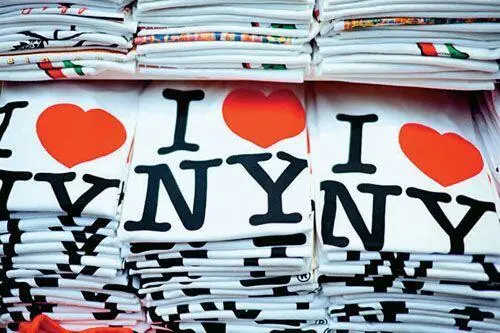
The first graphical symbol to enter the Oxford English Dictionary
New entries to the 2011 online edition of the Oxford English Dictionary include: ♥ to heart — meaning to love (e.g. I ♥ New York) — the first graphical symbol in the OED’s history; cream-crackered — rhyming slang for knackered, i.e. exhausted, lashed for drunk, fnarr fnarr for a lecherous snigger, dot-bomb meaning a failed internet company and couch surfing , ‘the practice of spending the night on other people’s couches in lieu of permanent housing’. Tragic has a new, twenty-first-century meaning: ‘a boring or socially inept person, especially a person who pursues a solitary interest with obsessive dedication’. The new entry wag is defined as an acronym for ‘the wives and girlfriends of any group of men, especially celebrities or sportsmen’, first mentioned in a Sunday Telegraph report in 2002 about the England football team’s partners; according to the OED , ‘ Wag is notable for the extremely fast journey from its introductions to the language to its use as usual English vocabulary.’ Muffin top enters the dictionary as ‘a protuberance of flesh about the waistband of a tight pair of trousers’. Although many of the words are computer and social networking jargon, television has influenced our everyday language as well. One TV programme in particular, The Simpsons , has created a raft of popular words and phrases. This hugely popular animated series about a dysfunctional American family has been on air since 1989 and, according to Mark Libermann, director of the Linguistic Data Consortium at the University of Pennsylvania, ‘has apparently taken over from Shakespeare and the Bible as our culture’s greatest source of idioms, catchphrases and sundry other textual allusions’.
D’oh , the grunt uttered by Homer Simpson, is the cartoon’s most popular neologism. Doh without the apostrophe entered the OED in 2001 as ‘expressing frustrations at the realisation that things have turned out badly or not as planned or that one has just said or done something foolish’. Meh , meaning ‘whatever’ or ‘boring’, is another Simpsons expression that has become particularly popular in the lexicon of web conversations. The Collins English Dictionary included it in 2008, giving as an example ‘The Canadian election was so meh ’; it’s not in the OED — the dictionary’s new words editor says it hasn’t quite yet passed into ‘widespread unselfconscious usage’ — but he’s keeping a ‘meh’ file. Other popular expressions include lupper (a calorie-laden meal in between lunch and supper) and the insult eat my shorts! In one episode the writers included two nonsense words, embiggen — to enlarge — and cromulent , meaning fine. ‘ He’s embiggened that role with his cromulent performance,’ says Principal Skinner. Both words were so convincing that cromulent has been included in various slang dictionaries and embiggen was used in a scientific paper on string theory: ‘there is a competing effect which can overcome the desire of the antiD3s to embiggen, namely their attraction towards the wrapped D5s’. Most cromulent.
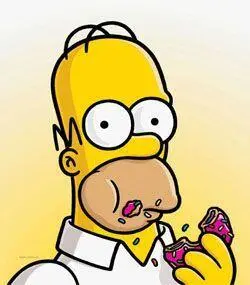
Is Homer Simpson the new Shakespeare?
The mobile phone and Facebook have become so much a part of personal communication that a whole new shorthand language has developed. Purists dismiss it as a sort of viral disease of GR8 s and 4U s which is wrecking language with its lazy spellings and impenetrable acronyms. Yet language needs to be expedient, and abbreviations or acronyms can be jolly useful. We happily talk about ASAP or DIY or BYOB (bring your own bottle). So the texter or the Twitterer or the Facebooker, who needs to be speedy and save money by using as few letters as possible and avoid finger strain, abbreviates words — often in highly ingenuous ways.
Some of these abbreviations are fairly functional: GR8 (great), BRB (be right back), ATB (all the best) and HRU (how are you?). Some bits of textese have become so widespread that, according to the Oxford English Dictionary, they’ve officially entered the English language. New entries for 2011 are OMG (Oh my God) and LOL (laughing out loud), joining IMHO (in my humble opinion), TMI (too much information) and BFF (best friends forever). Textese can be playful, personal — MWAH to suggest the sound of sending a kiss and RME for ‘rolling my eyes’. The really interesting words are those which are stepping out of the text zone and entering spoken language. LOL is now used as a noun for laugh — lol — or a verb — to lol. JK for ‘just joking’ is added at the end a sentence: ‘I forgot your birthday … JK!’. Soz! has become a lighthearted ‘sorry’.
Keypad symbols can portray moods in texts — although they do require a certain repositioning of the mobile phone to get the full effect:
Читать дальше
